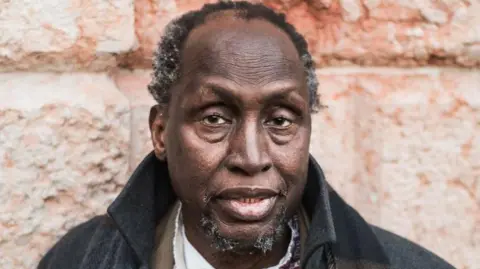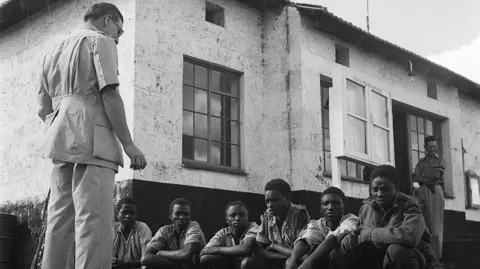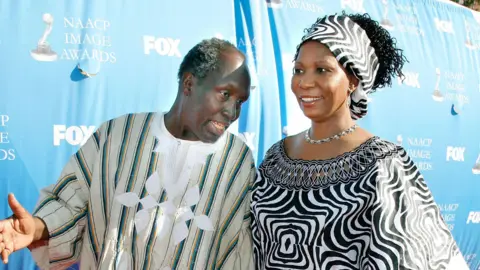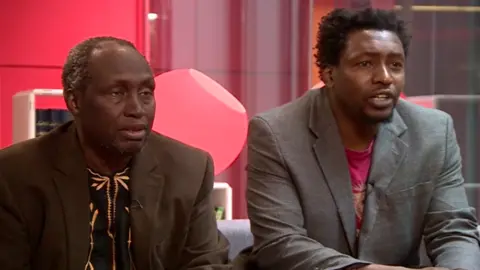BBC News
 They are
They areNgggi va Thiong’o, who died older than 87 years, He was Titan of modern African literature – a narrator who refused to be bound by imprisonment, exile and disease.
His work Jepan is about six decades, primarily documenting the transformation of his country – Kenya – from the colonial subject to democracy.
Ngggi was overturned to win the Nobel Reward for literature countless times, leaving fans who violated every time a medal slipped through her fingers.
He will remember not only as a writer in water knives, but also as a fiercely advocate of literature written in parent African languages.
Ngggi was born James Thiong’o Ngggi in 1938., when Kenya was under the British colonial rule. He grew up in the city of limor among the great family of agricultural workers with low income.
His parents cut and saved to pay their classes in the alliance, boarding the boarding of British missionaries.
To an interviewNgggi was recalled the return of the Allies at the end of the term to find the entire village released by the colonial authorities.
The members of his family were among hundreds and thousands forced to live in camps during cracks on MAU MAU, moving independence.
Entrywhich lasted from 1952. until 1960. year, he touched the life of NGGG in numerous, destructive ways.
In one of the most crushed NGUG-I, gitogo brother, he is deadly in his back due to the refusal to comply with the British soldier command.
Gitogo didn’t hear the command because he was deaf.
 Getti images
Getti imagesIn 1959, as British struggled to maintain his grip on Kenya, left she left to study in Uganda. He enrolled at Makerere University, which remains one of the most prestigious FROMITIAL universities in Africa.
During the printer conference on Makeerere, Ngggi shared the manuscript for his debit novel with respect to the Nigerian Author of Chinu Acheba.
Achebe forwarded the manuscript to his publisher in the UK and the book, named Clya, no, the child was released critically recognized in 1964. years. It was the first main novel of the English language written by the East African.
Ngggi quickly followed two more popular novels, wheat grains and rivers in between. In 1972, the newspapers told NGGGI, and then from 33 years, “accepted as one of the extraordinary modern writers of Africa”.
Then he came in 1977. years – the period that marked a huge change of life and career ngggi. For starters, it was years old, he became Ngugz Va Thiong’o and shed his birth, James. Ngggi made a change while he wanted the name without colonial influence.
He also fell English as the main language for his literature and promised to just write only in the mother tongue, Kikui.
He has published the last novel of English, the petals of the blood in 1977. years.
The previous books of NGGG were critical to colonial condition, but the petals of blood attacked new leaders of Independent Kenya, showing them as an elite class that issued ordinary Kenyans.
Ngggi didn’t stop there. In the same year, Ko-wrote a play Ngaahika Ndeenda (I’ll be married when I want), which was tightening in Keny’s class class.
Her theater was closed by the government of the then president Jomo Kenyatta and Ngggi was closed in the maximum prison in a year without trial.
It was fruitful for 12 months, however, while Ngug said his first Kikui Roman, the devil on the cross, while he was in prison. It is said that he used toilet paper to write the whole book, because he did not have access to a notebook.
 Getti images
Getti imagesNgggi was released after Daniel Arap Mai replaced Mr. Kenyatta as president.
Ngggi said four years later, while in London to start a book, He learned to be seduced to kill him Upon returning to Kenya.
Ngggi began the self-exile in the UK, and then now. He did not return to Kenya for 22 years.
When he finally returned, he received heroic welcome – it turned out that thousands of Kenyans greeted him.
But the return was boarded when the attackers broke into the NGUG flat, brutally attacking the author and raping his wife.
Ngugi insisted on attack “politically”.
He returned to the United States, where he held professors at universities, including Yale, New York and California Irvine.
In the Academy and beyond, Ngggi became known as one of the most important planners of literature written in African languages.
During his career – and on this day – African literature dominated books written in English or French, official languages in most countries on the continent.
“What is the difference between a politician who says that Africa can’t without imperialism and a writer who says Africa cannot without European languages?” He enrolled in a seminal, fire collection of essays, appointed decoluting the mind.
In one section, Ngggi called the Chinua Achebe – the author who helped start his career – to write in English. Their friendship produced as a result.
Far from his literary career, Ngggi was married – and divorced – twice. He had nine children, four of whom were published by authors.
“My family has become one of my literary rivals,” he joked at 2020. Years La Times Interview.

His son of a mucoma va ngugi, stated that his mother physically abused Ngugz Va Thiong’o.
“Some of my earliest memories that I will visit her in my grandmother, where he would seek refuge,” his son was written in a social media site, which Nggga va Thiong’o did not answer.
It was later in his life, the health of NGGG’s worsened. He had three times roundout surgery in 2019. years and began to fight the kidney failure. In 1995. the prostate cancer was diagnosed and given for three months to live.
However, Ngggi recovered, however, adding cancer to the length of the fighting prevailed.
But now one of the leading lights with African literature – as Nigerian Writer Chimandanda Ngozi Adichie called her once – no, leaving the world of words a little darker.
You can also be interested in:
 Getty Images / BBC
Getty Images / BBC





